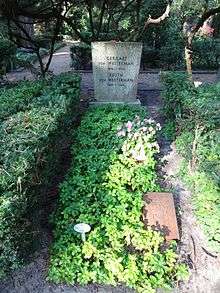Gerhart von Westerman
Gerhart von Westerman (19 September 1894 – 14 February 1963) was a German composer, artistic director and music writer.
Life
Born in Riga, after graduating from high school Westerman studied composition at the Hochschule für Musik in Berlin, where Paul Juon was his teacher. From 1918 he continued his studies with Walter Courvoisier and August Reuß in Munich and received his doctorate in 1921 with a thesis on "Giovanni Porta als Opernkomponist".
In Munich he became head of department at the radio station in 1925, later at the radio stations in Berlin and Saarbrücken. In 1939 the Berlin Philharmonic appointed him as its artistic director (as successor to Hans von Benda). He held this office until 1945 and then again from 1952 onwards[1] until 1959 from. In 1951 he founded the Berliner Festwochen, which he organized every year from then on until 1959.

Westerman died in Berlin at the age of 68. He is buried at the Waldfriedhof Dahlem. His grave is marked as dedicated as Grave of honour of the state of Berlin
Works
Orchestral pieces
- Serenade, op. 7, 1928
- Intermezzi, op. 9, 1929
- Divertimento, op. 16, 1940
Operas
- Prometheische Phantasie, composition and libretto, premiere 1960 in Dortmund
- Rosamunde Floris, libretto, music by Boris Blacher, premiere 1960 in Berlin
Awards
- 1962: Berliner Kunstpreis
Further reading
- Gerhart von Westerman. Eine kleine Monographie.[4] Bote & Bock, Berlin/Wiesbaden 1959 (with contributions by Hans Heinz Stuckenschmidt and Peter Wackernagel, also contains a catalogue raisonné).
- Friedrich Herzfeld: Das Lexikon der Musik.[5] Ullstein, Frankfurt/Berlin/Vienna 1976.
- Gerhart von Westerman, Karl Schumann: Knaurs Opernführer.[6] paperback Nr. 216.
- Helmut Scheunchen: Lexikon deutschbaltischer Musik.[7] Lexikon deutschbaltischer Musik, Verlag Harro von Hirschheydt, Wedemark-Elze 2002. ISBN 3-7777-0730-9, pp. 286–287.
- Carola L. Gottzmann, Petra Hörner: Lexikon der deutschsprachigen Literatur des Baltikums und St. Petersburgs.[8] Walter de Gruyter, Berlin 2007, ISBN 978-3-11-019338-1, pp. 1399–1401.
References
- N.N.: Berliner Köpfe - Gerhart von Westermann [sic]. In Berliner Blätter. The house magazine of the Reich capital. Edition B, 7th year no. 10, October 1957, p. 31.
- Das russische Volkslied, wie es heute gesungen wird on WorldCat
- Knaurs Konzertführer on WorldCat
- Gerhart von Westerman. Eine kleine Monographie. on WorldCat
- Das Lexikon der Musik on WorldCat
- Knaurs Opernführer on WorldCat
- Das Lexikon der Musik mit 4500 Stichwörtern on WorldCat
- Lexikon der deutschsprachigen Literatur des Baltikums und St. Petersburgs on WorldCat
External links
- Literature by and about Gerhart von Westerman in the German National Library catalogue
- Bild des Komponisten und Ausführungen zu seinem Kompositionsstil
- Bücher von Westerman
- Gerhart-von-Westerman-Archiv at the Academy of Arts, Berlin
- Baltische Historische Kommission Westerman(n), Gerhart v. (1894-1963) on Baltisches biografisches Lexikon digital